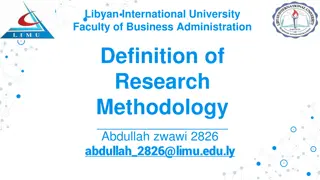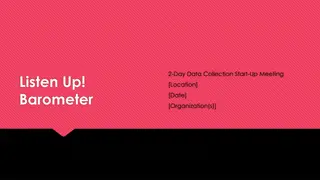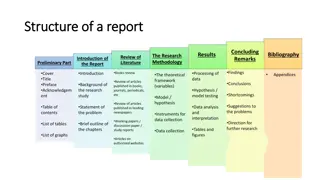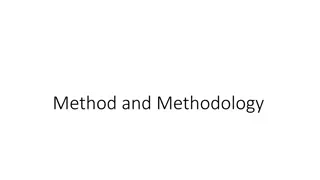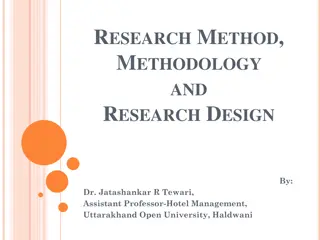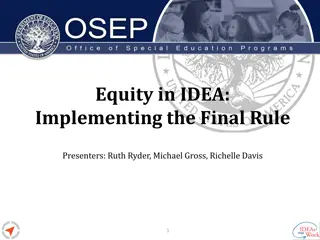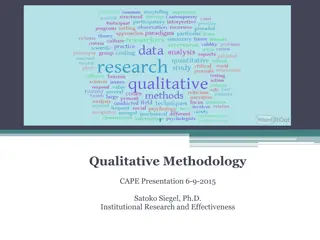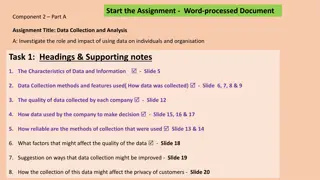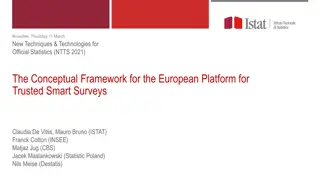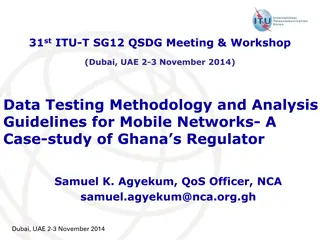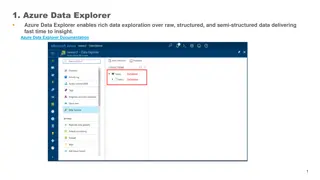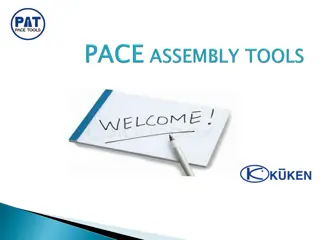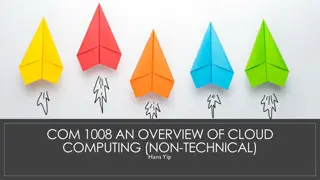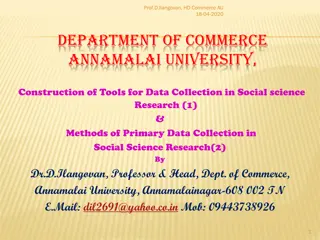Understanding Research Methodology: Tools, Techniques, and Data Collection
Explore the world of research methodology with Dr. Unnikrishnan P.C., a Professor of Electrical and Electronics Engineering. Learn about the tools and techniques of data collection, different types of data, experiments, surveys, and the differences between survey and experiment data. Discover methods of collecting primary data such as questionnaires, schedules, observation, and interviews. Delve into the process of data collection through questionnaires and gain insights into conducting effective research.
Download Presentation

Please find below an Image/Link to download the presentation.
The content on the website is provided AS IS for your information and personal use only. It may not be sold, licensed, or shared on other websites without obtaining consent from the author. Download presentation by click this link. If you encounter any issues during the download, it is possible that the publisher has removed the file from their server.
E N D
Presentation Transcript
Research Methodology Dr. Unnikrishnan P.C. Professor, EEE
Module II Tools and Techniques of Data Collection
Research Process Step V. Collect Data(Execution)
Types of data Primary data : Primary data are collected for the first time and happen to be original in character. Secondary data: Secondary data are those which have already been collected by someone else and which have already been passed through the statistical process.
Experiments and Surveys An experiment refers to an investigation in which a factor or variable under test. We collect primary data during the course of doing experiments in an experimental research. In the case of descriptive type research we perform surveys ,weather sample surveys or census surveys. Primary data of this type of research can be obtained by surveys, interview, observation.
Difference between survey and Experiment Data 1. Surveys Descriptive research Experiment Experimental research 2. Surveys Large Samples Experiment Small Samples 3. Surveys Describing, recording, analyzing and interpreting Experiment Systematic and logical method 4. Surveys Social and behavioral science Experiment Physical and natural science
Difference between survey and experiment Data 5. Surveys Field research Experiment Laboratory research 6. Surveys classified as social surveys, economic surveys or public opinion surveys Experiment Data collected from several readings of experiments
Collection of Primary data Methods of Collecting primary data 1. Questionnaires 2. Schedules 3. Observation 4. Interview
Data collection through Questionnaires In this method a questionnaire is sent (usually by post) to the persons concerned with a request to answer the questions and return the questionnaire. A questionnaire consists of a number of questions printed or typed in a definite order on a form or set of forms. The questionnaire is mailed to respondents who are expected to read and understand the questions and write down the reply in the space meant for the purpose in the questionnaire itself.
Merits of Questionnaire Method 1. Low cost - when the universe is large. 2. It is free from the bias of the interviewer. 3. Respondents have adequate time to give well thought out answers. 4.Respondents, who approachable, can conveniently. 5 Large samples can be made use of and thus the results can be made more dependable and reliable. are also not be easily reached
Demerits of Questionnaire Method 1. Low rate of return of the duly filled in questionnaires. 2. It can be used only when respondents are educated and cooperating. 3. The control over questionnaire may be lost once it is sent. 4. There is also the possibility of ambiguous replies or omission of replies altogether to certain questions; interpretation of omissions is difficult. 5. It is difficult to know whether willing respondents are truly representative. 6. This method is likely to be the slowest of all. It is advisable to conduct a PilotStudy for testing questionnaires.
Main Aspects of a Questionnaire 1. General Form 2. Question sequence 3. Question formulation and sequence
General Form So far as the general form of a questionnaire is concerned, it can either be structured or unstructured questionnaire. Structured questionnaires are those questionnaires in which there are definite, concrete and pre-determined questions. The questions are presented with exactly the same wording and in the same order to all respondents. Resort is taken to this sort of standardization to ensure that all respondents reply to the same set of questions. In an unstructured questionnaire, the interviewer is provided with a general guide on the type of information to be obtained, but the exact question formulation is largely his own responsibility and the replies are to be taken down in the respondent s own words to the extent possible.
Question sequence In order to make the questionnaire effective and to ensure quality to the replies received, a researcher should pay attention to the question-sequence in preparing the questionnaire. A proper sequence of questions reduces considerably the chances of individual questions being misunderstood.The following type of questions should generally be avoided as opening questions in a questionnaire: 1. questions that put too great a strain on the memory or intellect of the respondent; 2. questions of a personal character; 3. questions related to personal wealth, etc.
Question formulation and sequence Each question must be very clear for any sort of misunderstanding can do irreparable harm to a survey. In general, all questions should meet the following standards (a) should be easily understood; (b) should be simple i.e., should convey only one thought at a time; (c) should be concrete and should conform as much as possible to the respondent s way of thinking.
Data collection through Schedules This method of data collection is very much like the collection of data through questionnaire, with little difference which lies in the fact that schedules (proforma containing a set of questions) are being filled in by the enumerators who are specially appointed for the purpose. These enumerators along with schedules, go to respondents, put to them the questions from the proforma in the order the questions are listed and record the replies in the space meant for the same in the proforma. In certain situations, schedules may be handed over to respondents and enumerators may help them in recording their answers to various questions in the said schedules.
Data collection through Observation Under the observation method, the information is sought by way of investigator s own direct observation without respondent. For instance, in a study relating to consumer behavior, the investigator instead of asking the brand of wrist watch used by the respondent, may himself look at the watch. The main advantage of this method is that subjective bias is eliminated, if observation is done accurately. asking from the
Data collection through Observation Cont Secondly, the information obtained under this method relates to what is currently happening; it is not complicated by either the past behavior or future intentions or attitudes. Thirdly, this method is independent of respondents willingness to respond and as such is relatively less demanding of active cooperation on the part of respondents as happens to be the case in the interview or the questionnaire method.
Limitations of Observation It is an expensive method. The information provided by this method is very limited. Sometimes unforeseen factors may interfere with the observational task.
Data collection through Interview The interview method of collecting data involves presentation of oral-verbal stimuli and reply in terms of oral-verbal responses. This method can be used through personal interviews and, if possible, through telephone interviews.
Personal Interviews Personal interview method requires a person known as the interviewer asking questions generally in a face-to-face contact to the other person or persons. This sort of interview may be in the form of direct personal investigation or it may be indirect oral investigation. In the case of direct personal investigation the interviewer has to collect the information personally from the sources concerned. He has to be on the spot and has to meet people from whom data have to be collected.
Personal Interviews -Types Structured Interview Unstructured Interview Focused Interview Clinical Interview Non-directive interview
Merits of Personal Interviews (i) More information and that too in greater depth can be obtained. (ii) Interviewer by his own skill can overcome the resistance, if any, of the respondents; the interview method can be made to yield an almost perfect sample of the general population. (iii) There is greater flexibility under this method as the opportunity to restructure questions is always there, specially in case of unstructured interviews. (iv) Observation method can as well be applied to recording verbal answers to various questions. (v) Personal information can as well be obtained easily under this method.
Merits of Personal Interviews (vi) Samples can be controlled more effectively as there arises no difficulty of the missing returns; non- response generally remains very low. (vii) The interviewer can usually control which person(s) will answer the questions. This is not possible in mailed questionnaire approach. If so desired, group discussions may also be held. (viii) The interviewer may catch the informant off- guard and thus may secure the most spontaneous reactions than would be the case if mailed questionnaire is used.
Merits of Personal Interviews (ix) The language of the interview can be adopted to the ability or educational level of the person interviewed and as such misinterpretations concerning questions can be avoided. (x) The interviewer can information about the characteristics and environment which is often of great value in interpreting results. collect respondent s supplementary personal
Demerits of Personal Interviews (i) It is a very expensive method, specially when large and widely spread geographical sample is taken. (ii) There remains the possibility of the bias of interviewer as well as that of the respondent; there also remains the headache of supervision and control of interviewers. (iii) Certain types of respondents such as important officials or executives or people in high income groups may not be easily approachable under this method and to that extent the data may prove inadequate.
Demerits of Personal Interviews (iv) This method is relatively more-time-consuming, specially when the sample is large and recalls upon the respondents are necessary. (v) The presence of the interviewer on the spot may over- stimulate the respondent, sometimes even to the extent that he may give imaginary information just to make the interview interesting. (vi) Under the interview method the organisation required for selecting, training and supervising the field-staff is more complex with formidable problems.
Demerits of Personal Interviews (vii) Interviewing at times may also introduce systematic errors. (viii) Effective interview proper rapport with respondents that would facilitate responses. This is often a very difficult requirement. presupposes free and frank
Telephonic Interviews This method of collecting information consists in contacting respondents on telephone itself. It is not a very widely used method, but plays important part in industrial surveys, developed regions. particularly in
Merits of Telephonic Interviews 1. It is more flexible in comparison to mailing method. 2. It is faster than other methods i.e., a quick way of obtaining information. 3. It is cheaper than personal interviewing method; here the cost per response is relatively low. 4. Recall is easy; callbacks are simple and economical. 5. There is a higher rate of response than what we have in mailing method; the non-response is generally very low. 6. Replies can be recorded without causing embarrassment to respondents.
Merits of Telephonic Interviews 7. Interviewer can explain requirements more easily. 8. At times, access can be gained to respondents who otherwise cannot be contacted for one reason or the other. 9. No field staff is required. 10. Representative and wider distribution of sample is possible.
Demerits of Telephonic Interviews 1. Little time is given to respondents for considered answers; interview period is not likely to exceed five minutes in most cases. 2. Surveys are restricted to respondents who have telephone facilities. 3. Extensive geographical coverage may get restricted by cost considerations. 4. It is not suitable for intensive surveys where comprehensive answers are required to various questions.
Demerits of Telephonic interviews 5. Possibility of the bias of the interviewer is relatively more. 6. Questions have to be short and to the point; probes are difficult to handle.


